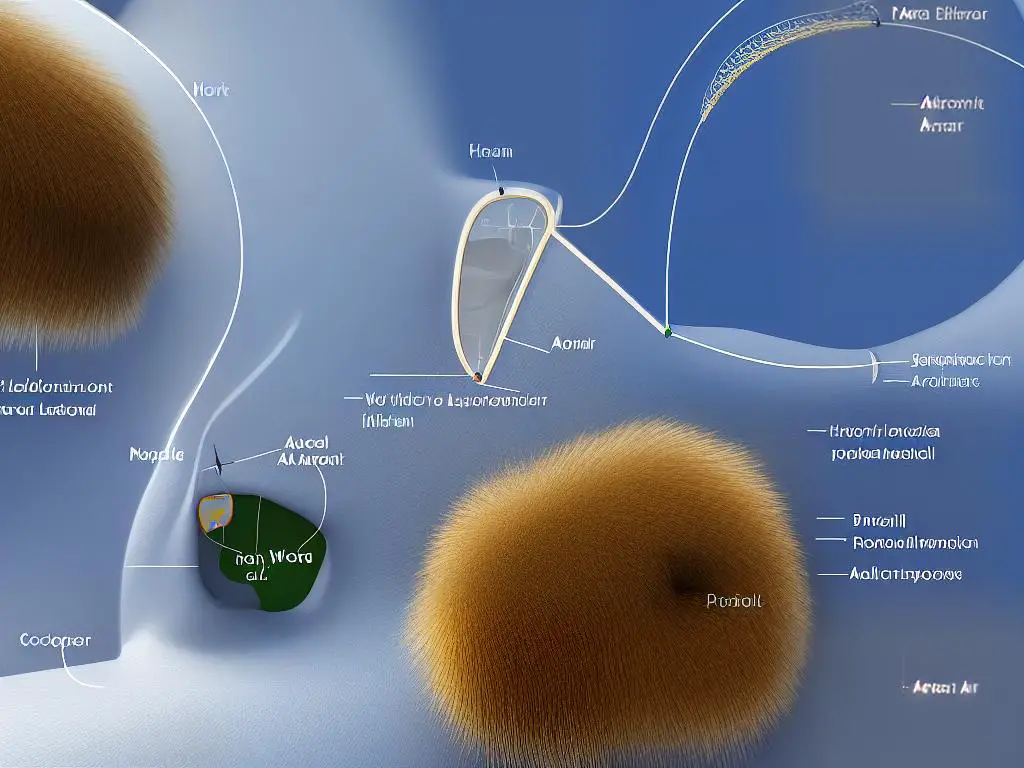Preventing and Treating Poodle Ear Infections: A Complete Guide
When it comes to our furry friends, their health and comfort rank at the top of our priorities. Poodles, known for their intelligence and charm, unfortunately, come with a susceptibility to a common canine concern – ear infections. These issues are not only uncomfortable for the pooch, but left untreated, they can develop into serious complications. It’s essential, as Poodle parents or Poodle enthusiasts, that we arm ourselves with the right knowledge to recognize early signs of ear infections, understand the common causes, remedies, professional treatments, and valuable tips to prevent them. With this knowledge, we can ensure our beloved poodles stay playful, comfortable, and free from the distressing symptoms of an ear infection.
Recognizing Early Symptoms of Ear Infections in Poodles
Understanding Poodle Ear Infections: Recognizing Early Symptoms
Poodles, with their floppy ears and curly hair, are often more susceptible to ear infections than other breeds. Recognizing the early symptoms can expedite treatment and provide your beloved pet with much-needed relief from discomfort.
Common Signs and Symptoms of Ear Infections
The first line of defense in preventing serious ear infections in poodles is to be aware of the common signs and symptoms. Often, poodles suffering from an ear infection will exhibit behaviors like incessant scratching of the ears, head shaking, rubbing their ears on furniture or the ground, and showing a general discomfort.
Another noticeable change is redness in the dog’s ear. A healthy dog’s ear should be light pink, clean, and devoid of any foul/smelly discharge. Any deviation such as redness, swelling, or changes in ear wax color or consistency might be indicative of an infection. Any unusual or persistent discharge from the ears, especially if it’s malodorous, is another significant symptom.
Getting to Grips with the Underlying Causes
Before we can effectively prevent or treat ear infections in poodles, it’s crucial to understand the root causes. A poodle’s unique ear structure makes it particularly susceptible to these infections. With their long and pendulous ears, poodles are prone to trapping moisture in the ear canal, thereby creating the perfect breeding ground for yeast and harmful bacteria. Other variables, such as allergies, the presence of foreign bodies, or hormonal imbalances, can also cause these infections.
Detecting these infections early on is the key to reducing your poodle’s discomfort. Recognizing symptoms and timely consultation with a veterinarian can mitigate your pet’s suffering substantially. Depending on the severity and nature of the infection, your vet will suggest an appropriate treatment plan, which can range from antifungal or antibacterial medications to, in some cases, surgical interventions.
As an essential footnote, our pets’ health and happiness largely depend on our observation skills and timely action. As devoted pet parents, it’s our duty to stay attuned to any behavioral changes and attend to them, irrespective of how insignificant they might seem. Doing so aids in early detection of possible health complications such as ear infections, ensuring a healthier and happier life for our furry friends.

Common Causes of Ear Infections in Poodles
What Causes Ear Infections in Poodles?
The unique ear structure of poodles is a significant factor contributing to their propensity to develop ear infections. Unlike other breeds with upright ears, poodles sport floppy ears that cover the ear canal, restricting much-needed airflow. This structure is predisposed to developing a moist and dark environment that is conducive to the growth of bacteria and yeast. Additionally, such ear types can often trap dirt, debris, or grass seeds, facilitating the onset of infections. Here are some of the most common causes of ear infections prevalent particularly among poodles:
Allergies
Allergies, more than any other cause, are responsible for many ear infections in poodles. A poodle’s ears are extremely sensitive, and the skin inside is prone to inflammation from various allergens. This inflammation often results in an overgrowth of normal bacteria and yeast present in the ear. The heightened response to allergens like pollen, mold, dust mites, or certain foods contributes to the likelihood of developing ear infections.
Yeast and Bacterial Infections
Yeast and bacteria are naturally present in a dog’s ear. However, under certain conditions like excess moisture, warmth, or immune system issues, these organisms can multiply and cause an infection. Poodles, because of their unique ear structure, are more susceptible to these types of infections than other breeds.
Foreign Bodies
Foreign bodies such as grass seeds, ticks, dirt, or sand can make their way into a poodle’s ear, causing inflammation, infection, or even damage to the eardrum if left untreated. Poodles with their ears down are more likely to get foreign bodies in their ears during outdoor activities than breeds with upright ears.
Hormonal Imbalance
Certain endocrine diseases, like hypothyroidism or Cushing’s disease, can lead to changes in the skin’s pH and flora, making dogs more susceptible to ear infections. While any breed can develop these conditions, they’re often more prevalent in certain types of poodles, particularly Miniature Poodles.
Ear Mites
Ear mites are tiny parasites that live inside the ear and feed on wax and oils. They are more common in kittens and puppies, but adult poodles can still be affected. Mites cause intense itching and irritation, leading to overproduction of wax, which can then result in secondary bacterial or yeast infections.
Preventing Poodle Ear Infections
Regular ear checks, appropriate cleaning, managing any allergies, and prompt treatment of any underlying conditions are all critical steps in preventing ear infections in poodles. Indeed, adhering to healthy practices such as a balanced diet, regular exercise, and consistent veterinary check-ups are all essential to your poodle’s overall well-being. Keeping an eye out for common signs of an ear infection, such as head shaking, ear scratching, unusual odors, or ear discharge, is crucial. Immediate veterinary action should be taken should any of these symptoms arise to stave off the worsening of the condition.

Effective Home Remedies for Poodle Ear Infections
Home Remedies for Poodle Ear Infections
Navigating the journey of managing and relieving your poodle’s ear infections at home can lead not only to immense satisfaction but also to much needed comfort for your poodle. Witnessing your furry friend grappling with the immense discomfort of an ear infection can trigger anxiety for both of you, especially given the risk of complications like hearing loss.
Before you explore the wide array of home remedies available, remember that consulting with a veterinary professional should be your first course of action in dealing with such health issues. They can ensure any treatment you undertake is appropriate and safe.
Cleaning with Vet-Approved Solutions
One of the most common and effective means of dealing with a poodle’s ear infection is to clean the infected ear with a vet-approved cleaning solution. Keeping your poodle’s ears dry and clean is key to averting potential ear infections. Most veterinarians recommend a weekly ear cleaning using an ear cleaning solution specifically designed for dogs to help maintain a healthy ear environment and stave off infections.
While a vet-recommended solution is optimal, a homemade mix using equal parts of white vinegar and water can also be useful for cleaning. The effectiveness of this method is attributed to the vinegar’s inherent antibacterial properties. This cleaning solution should be used with care, only after verifying the intactness of your dog’s eardrum to avoid irritation or damage.
Apple Cider Vinegar Mixtures
Another natural solution to help alleviate your poodle’s ear infection is an apple cider vinegar mixture. Many dog owners argue that apple cider vinegar’s antiseptic qualities make it a helpful tool in preventing and curing ear infections.
A solution can be made by simply diluting apple cider vinegar with an equal amount of warm water. The mixture can then be gently applied in the ear using a cotton ball. Bear in mind that the apple cider vinegar mixture shouldn’t be applied to dogs with ruptured eardrums or raw skin, as it could cause considerable discomfort.
Other Natural Substances
A variety of other natural substances can be considered when tackling poodle ear infections. Coconut oil, which is renowned for its antibacterial and antiviral properties, can prove effective in combating yeast infections when applied topically to the infected ear.
Similarly, Mullein, a herb that boasts anti-inflammatory, antibacterial, and antiviral properties, can also be utilized for ear infections. It can be purchased as drops at most pet health stores.
Wrapping Up
Treating poodle ear infections properly is reliant on a precise diagnosis and meticulously followed aftercare. It’s crucial to not underestimate the importance of consulting with a vet, even though home remedies can be helpful. Home treatments are not a substitute for professional medical advice, particularly in cases of chronic or severe infections. Above all else, remember that your vet is the most reliable source of advice regarding your poodle’s health and well-being.

Professional Treatment Options for Poodle Ear Infections
Getting to Know Poodle Ear Infections
It’s worth noting that poodles are frequently plagued by ear infections due to their distinctive long, fluffy ears. These types of ears can limit necessary ventilation, consequently creating an ideal breeding ground for bacteria, yeast, or mites. This can result in ear infections marked by a range of symptoms including redness, unpleasant odor, discharge, scratching, pain, unusual irritability, and excessive head shaking.
Professional Treatments for Poodle Ear Infections
Medications
- Topical Medications – These are often the first line of treatment for ear infections in poodles. Topical antibiotics or antifungals can be applied directly to the affected ear to treat bacterial or fungal infections. Other topical medications can help reduce inflammation or treat parasitic infestations.
- Oral Medications – In severe cases, your vet may prescribe oral antibiotics or antifungal medications. These are used when the infection has spread beyond the ear canal or when topical treatment fails.
Ear Cleaning
Your vet may provide a professional ear cleaning, especially if there is a substantial amount of debris or wax buildup. This procedure typically involves sedation and allows the vet to thoroughly clean the dog’s ears without causing discomfort.
Surgical Interventions
While most poodle ear infections can be resolved with medication, sometimes surgical intervention is necessary. An operation called a lateral ear canal resection can improve ventilation within the ear canal, helping to prevent future infections.
Laser Therapy
Some veterinarians offer innovative treatments, like laser therapy, for ear infections. The low-level laser can help to reduce inflammation and stimulate cell regeneration, aiding in faster healing.
When to Consult a Veterinarian
It’s crucial to consult with a vet if you suspect your poodle has an ear infection. Early intervention can help prevent complications and more serious health problems. While home remedies may work for minor issues, they are not a substitute for professional veterinary care.
If your poodle displays symptoms such as redness, swelling, odor, or appears to be in pain or discomfort, do not hesitate to seek professional help. Any signs of hearing loss, balance issues, or facial paralysis also warrant immediate veterinary attention.
Your vet can provide a conclusive diagnosis and recommended treatment plan. They may also provide advice on preventative measures to help reduce the chance of further infections.
Conclusion
To wrap up, it is of utmost importance to stress that managing a poodle’s ear infection often demands both time and care. Definitely, professional intervention can yield effective results; nevertheless, defense is the best offense. Regular cleaning of the ears, routine check-ups, and fostering a wholesome lifestyle for your poodle can collectively aid in warding off ear infections.

Preventing Future Ear Infections: Tips and Tricks
The Unique Ear Structure of Poodles: Innate vulnerability to infections
Due to their unique ear structure, Poodles are inherently predisposed to ear infections. Their ears hang downwards, an attribute which restricts appropriate air circulation and subsequently results in moisture and wax accumulation. Coupled with the thick hair growth within the ear canal, these conditions present an ideal environment for bacteria and yeast to flourish, thereby escalating their susceptibility to ear infections.
Proper Ear Maintenance: Best line of defense
Proper ear hygiene for poodles is crucial to prevent infections. It is advisable to clean your poodle’s ears once a week using a veterinarian-recommended cleaning solution. Drop the solution into your dog’s ear canal, softly rub the base of the ear to distribute the cleaner evenly, and then use a cotton ball to gently wipe out any debris. Ensure you never use a Q-tip or invade the ear canal, as this can further push the debris inside and potentially damage the ear.
Regular Grooming: Keep infection at bay
Poodles are known for their fluffy curls, which also grow inside their ears acting as a magnet for dirt, moisture, and bacteria. Regular grooming is thus essential to keep them infection-free. An essential part of this should be the removal of fur in your poodle’s ear. It is critical to ensure a professional groomer or vet carries out this delicate task to avoid injury to the poodle’s ear canal.
Balanced Diet: Boosting immunity for the win
Diet plays a crucial role in boosting your poodle’s immune system, thus effectively combatting bacteria and yeast that cause ear infections. Ensure your poodle’s diet is filled with nutritious food and is omega-3 rich, which has potent anti-inflammatory properties. Try adding fish oils or flaxseed to your dog’s food, both of which are great sources of omega-3.
Regular Vet Checks: Early infections don’t stand a chance
Regular vet checks help in early detection of infections, particularly for poodles given their predisposition to ear problems. The veterinarian can catch early signs of infections before they become more severe or recurrent. The general recommendation is at least once a year vet checks for all dogs, but for poodles, you might want to consider more frequent visits.
Exercise and General Health: Every step counts
Regular exercise helps to keep your poodle healthy and improves its overall metabolism and immune system. Coupled with maintaining a healthy weight, it will help to prevent various health issues, including ear infections. Regular walks, play sessions, and mentally stimulating activities are good for their overall health.
Remember, the key to preventing recurrent ear infections in poodles includes early detection, regular cleaning and grooming, maintaining a balanced diet, and ensuring frequent vet checks. Each one plays a vital role in ensuring your poodle lives a happier, healthier and ear infection-free life.

Ear infections in Poodles might be common, but that doesn’t mean they’re inevitable. A solid understanding of the causes, coupled with early detection skills and treatment options, can go a long way in managing this condition. It’s equally essential to have an understanding of preventive measures, not only to avert the inconvenience of an infection but also to uphold your pet’s overall health and happiness. Remember, while home remedies can mitigate some issues, there’s no alternative to professional veterinary intervention for severe cases. Treating our Poodles with the best care is part and parcel of our love for them, so let’s use our gained knowledge for their utmost comfort and wellbeing.
